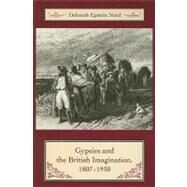Gypsies and the British Imagination, 1807-1930
, by Nord, Deborah Epstein- ISBN: 9780231137058 | 0231137052
- Cover: Paperback
- Copyright: 12/8/2008
Gypsies and the British Imagination, 1807-1930, is the first book to explore fully the British obsession with Gypsies throughout the nineteenth century and into the twentieth. Deborah Epstein Nord traces various representations of Gypsies in the works of such well-known British authors John Clare, Walter Scott, William Wordsworth, George Eliot, Arthur Conan Doyle, and D. H. Lawrence. Nord also exhumes lesser-known literary, ethnographic, and historical texts, exploring the fascinating histories of nomadic writer George Borrow, the Gypsy Lore Society, Dora Yates, and other rarely examined figures and institutions.Gypsies were both idealized and reviled by Victorian and early-twentieth-century Britons. Associated with primitive desires, lawlessness, cunning, and sexual excess, Gypsies were also objects of antiquarian, literary, and anthropological interest. As Nord demonstrates, British writers and artists drew on Gypsy characters and plots to redefine and reconstruct cultural and racial difference, national and personal identity, and the individual's relationship to social and sexual orthodoxies. Gypsies were long associated with pastoral conventions and, in the nineteenth century, came to stand in for the ancient British past. Using myths of switched babies, Gypsy kidnappings, and the Gypsies' murky origins, authors projected onto Gypsies their own desires to escape convention and their anxieties about the ambiguities of identity. The literary representations that Nord examines have their roots in the interplay between the notion of Gypsies as a separate, often despised race and the psychic or aesthetic desire to dissolve the boundary between English and Gypsy worlds. By the beginning of the twentieth century, she argues, romantic identification with Gypsies had hardened into caricature-a phenomenon reflected in D. H. Lawrence's The Virgin and the Gipsy-and thoroughly obscured the reality of Gypsy life and history.







